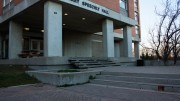In discussing the issue on the health of Lake Winnipeg, all contributors causing eutrophication must be identified. There is much more that needs to be done to improve our fresh water quality and supply, managing agricultural practises is not the only factor at play. Agricultural practises are being attacked as a major contributor of increased eutrophication in Lake Winnipeg. Efforts have been made to reduce nutrient runoff from fertilizers.
Hog farmers now commonly practise injection fertilization techniques, where manure is injected straight into the soil, minimizing runoff. Prior to the spreading of fertilizer, fields are soil tested to determine the adequate amount of fertilizer that is to be applied, reducing runoff of excess nutrients. Agriculture is of important economic value for our prairie province, and this sector has taken the initiative at protecting our immense freshwater resource we possess in a healthy Lake Winnipeg. It is time for all of the contributors of the exponential eutrophication growth in Lake Winnipeg to correct their involvement in destroying our lake, including the City of Winnipeg.
The combined sewer system that services nearly half of Winnipeg is responsible for dumping more than 2 million litres of untreated sewage into the Lake Winnipeg watershed this past year alone. The City of Winnipeg experiences an average of 20 overflows per year, resulting in 277 hours and 52 minutes of sewage escaping into both the Red and Assiniboine Rivers in 2011. These rivers flow into Lake Winnipeg, containing high amounts of phosphorus, nitrogen and organic matter. These high levels contribute to excess algal blooms and depleting oxygen levels which have caused severe ecological stresses to the aquatic ecosystem.
With the state of eutrophication in Lake Winnipeg today, actions must be taken to improve the health of our freshwater resource. Yet it seems neither the City of Winnipeg nor the Province of Manitoba are willing to spend the funds on upgrading the combined sewer system to reduce overflows and sewage leaking into our rivers. Agriculture is a contributor to the poor health of Lake Winnipeg and initiatives have been taken to reduce the amount of nutrients and organic matter from reaching our waterways. Now it`s time the pressure be put on our policy makers to rectify this issue of dumping human waste into our freshwater resources. The continued eutrophication of Lake Winnipeg would have devastating environmental and economic impacts; we must protect such an important freshwater resource.
Colin Durand



